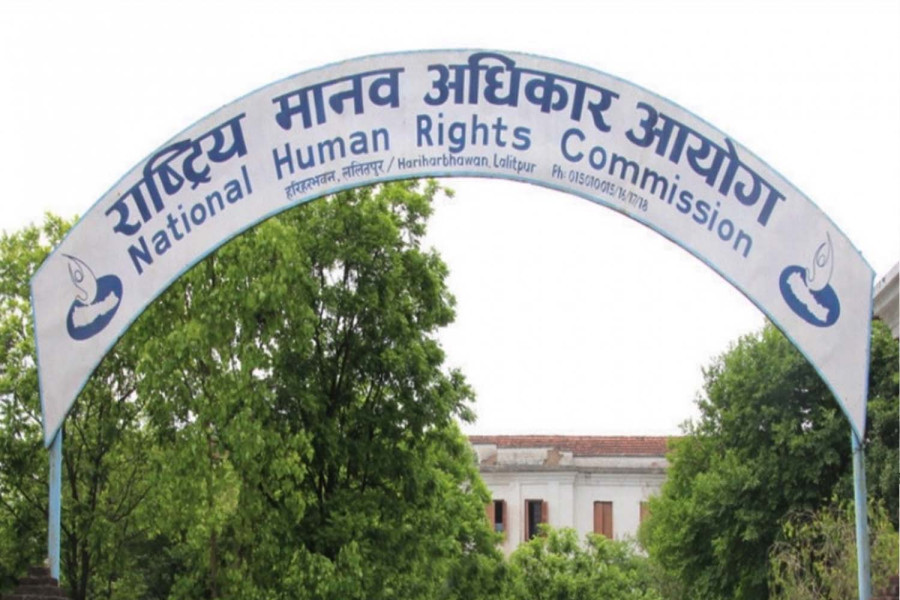National
Human Rights Commission requests global alliance to save its ‘A’ status
The umbrella body of human rights institutions from 127 countries is expected to make the decision within a week.
Post Report
The National Human Rights Commission has requested the Global Alliance of National Human Rights Institutions (GANHRI) to be allowed to retain its global “A” status, claiming that it has been working effectively in human rights protection hand in hand with civil society.
After holding a review for two consecutive years, a GANHRI sub-committee on accreditation (SCA) in October last year recommended downgrading the national human rights watchdog to the “B” category. Before taking the final decision of downgrade, the commission on Wednesday was allowed to present its defence.
Surya Dhungel, a commission member, said he confidently argued that the commission must not lose its present status as it is working to safeguard human rights.
“I said that the commission deserves the ‘A’ status for the effective role it has been playing to protect and promote human rights in close cooperation with civil society,” Dhungel told the Post. “I also highlighted that the government was positive about introducing a bill to amend the commission’s Act to allocate the authorities to the commission in line with the Paris Principle. I am hopeful that GANHRI will halt the downgrade.”
Alteration of the accreditation of the commission’s “A” status was on the agenda of the GANHRI’s annual session for 2023, held from Monday to Thursday. The umbrella body of human rights institutions from 127 countries is expected to take the final call within a week, according to Dhungel.
The SCA decided to review the commission’s present status following complaints from various human rights organisations, mainly over the appointments of the NHRC’s chairperson and members. After two reviews in 2021 and 2022, the GANHRI recommended the downgrade, saying the appointment process was flawed and the commission hadn’t played an effective role in safeguarding the rights of marginalised and minority communities.
Dhungel said though he defended the commission’s role, he didn’t talk about the appointment process as the matter was sub-judice in the Supreme Court.
The Constitutional Council led by then-prime minister KP Sharma Oli had nominated chairpersons and members to various constitutional bodies, including the NHRC, based on a revision to the Constitutional Council Act enforced through an ordinance on December 15, 2020. After the Council’s nominations, President Bidya Devi Bhandari on February 3, 2021 appointed the chair and four commissioners to the NHRC. They were appointed without going through parliamentary hearings in the absence of the House of Representatives.
Over half a dozen writ petitions challenging the ordinance and the appointment process are sub judice in the Supreme Court. The hearing on the petitions has been slated for December 6.
The SCA says that the appointments do not align with the Paris Principles. Adopted in 1993 by the United Nations General Assembly, the Paris Principles set six criteria that national human rights institutions must follow. These include autonomy from the government and the independence guaranteed by the constitution, besides adequate competence, pluralism and the availability of resources and powers to carry out investigations.
The commission has been arguing that the Supreme Court was testing the legality of the appointments while also reiterating that the appointments adhered to the Paris Principles.
Those informed about the accreditation process say it is possible for GANHRI to wait for a few months if the commission had strongly made its case. “I believe GANHRI can wait until the court ruling. However, it depends on how strongly the commission defended itself,” Bed Bhattarai, a former secretary at the commission, told the Post. “But, yes, it would be right to wait for the court ruling, which will possibly come in December.”
The GANHRI accreditation sub-committee meeting in 2021 didn’t take any decision on the NHRC’s fate as it waited for the court order. However, as the court did not decide on the matter even in a year, the sub-committee in October 2022 recommended downgrading the NHRC to ‘B’ category.
Only the country whose human rights commission is graded “A” can put forth its opinion in deliberations at the UN Human Rights Council and vote on its decisions. Similarly, only such countries can contest or vote for the leadership position in GANHRI and the Asia Pacific Alliance of Human Rights Institutions.




 13.12°C Kathmandu
13.12°C Kathmandu













